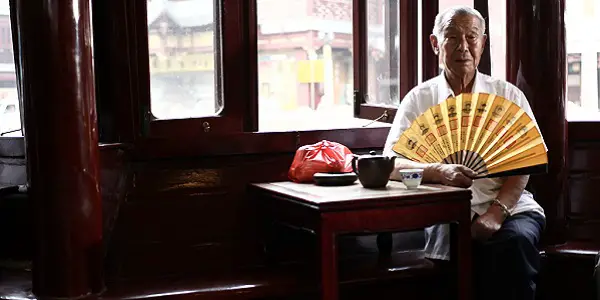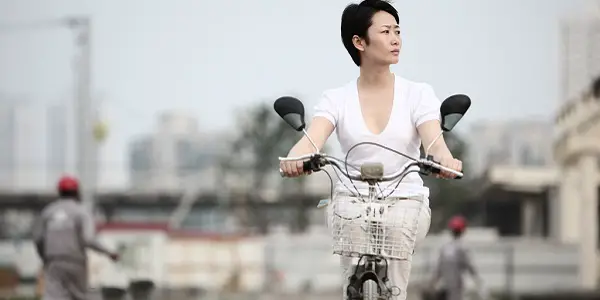I WISH I KNEW: Jia Zhangke’s Shanghai Serenade

Lee Jutton has directed short films starring a killer toaster,…
Zhangke Jia‘s s documentary I Wish I Knew premiered in the Un Certain Regard section of the Cannes Film Festival back in 2010, but it is only now being released in theaters in the United States in the form of a new “director’s cut” (which, in a refreshing change from most other director’s cuts, is actually shorter than the original release). Commissioned for the 2010 Shanghai World Expo, I Wish I Knew is a sprawling portrait of the city that stretches across the 20th century and beyond.
Ever one to eschew the straightforward approach, Jia (most recently responsible for the acclaimed drama Ash is Purest White) constructs his history of Shanghai via interviews with 18 different people whose lives have intersected with the city in some way, intercut with footage of Jia’s wife and collaborator Zhao Tao strolling through the Shanghai World Expo Park. The resulting film is an unusual but effective attempt at articulating the role Shanghai has played throughout modern history.
One Verse Follows Another
Shanghai is constantly evolving and has been since it officially opened as a port for international trade more than 150 years ago. I Wish I Knew focuses heavily on the period of the Cultural Revolution and the effect it had on the lives of artists in mainland China, for better or for worse – and in many cases, it ends up being the latter. While not overt in its criticism of the Communist Party, the film is subversive in its subtlety. Many of Jia’s subjects are either artists or related to them, including Hou Hsiao-hsien, the renowned Taiwanese filmmaker, who discusses his film Flowers of Shanghai; Zhu Qiansheng, who shares his memories of working with the legendary Michelangelo Antonioni on the 1972 documentary Chung Kuo, Cina; and Barbara Fei, the daughter of filmmaker Fei Mu, who tells the story of her father’s fall from grace in the eyes of the Communist Party and his resulting departure for Hong Kong, where he passed away in exile.

In fact, many of the subjects of I Wish I Knew have departed Shanghai and appear on camera living in Taiwan or Hong Kong, a fact that Jia does not bother to hide from viewers despite his film having been originally commissioned by the Chinese government. Yet even those who have not called Shanghai home for decades and left it under unpleasant (even dangerous) circumstances offer recollections of the city so vivid that one can practically see them playing out before one’s eyes on the screen, crackling with life like old home movie footage.
Wandering Through Memory
Jia mixes these offered memories with clips of the various films described by the directors and actors interviewed, a veritable chronology of 20th century Shanghai in cinematic form: Hou Hsiao-hsien’s Flowers of Shanghai (1998), Wang Toon’s Red Persimmon (1996), Wong Kar-wai’s Days Of Being Wild (1990). And, of course, amidst it all, there is Zhao Tao wandering near-silent through Shanghai in a plain white t-shirt, her own beauty as well as that of the city on full display courtesy of Nelson Lik-wai Yu’s lovely cinematography.

Like Zhao Tao’s walk, I Wish I Knew is seemingly aimless, winding its way through individual recollections of Shanghai with no clear objective in mind. Yet the recollections of its subjects, which in addition to artists include criminals, ex-soldiers and the children of politicians, are so fascinating that one doesn’t need to know where the film is going to enjoy the journey. For Western audiences who might not be fluent in the film’s subject matter, Jia provides an education of the kind we were never privileged enough to receive in school, where China is generally glossed over as a world power that remains shrouded in mystery. But the personal memories shared in I Wish I Knew, from grand historical events right down to individual moments of triumph and tragedy, peel away the layers to reveal a city that remains in perpetual motion to this day.
I Wish I Knew: Conclusion
One of the more poetic documentaries I have ever seen, I Wish I Knew is an ode to the impact one city has had, across so many decades, on so many lives.
What do you think? Are you familiar with the works of Zhangke Jia ? Does I Wish I Knew sound like it was worth the wait? Share your thoughts in the comments below.
I Wish I Knew opened in New York on January 24, 2020 and will be opening in Los Angeles and Chicago on February 14, 2020. For all international release dates, see here.
Does content like this matter to you?
Become a Member and support film journalism. Unlock access to all of Film Inquiry`s great articles. Join a community of like-minded readers who are passionate about cinema - get access to our private members Network, give back to independent filmmakers, and more.
Lee Jutton has directed short films starring a killer toaster, a killer Christmas tree, and a not-killer leopard. Her writing has appeared in publications such as Film School Rejects, Bitch: A Feminist Response to Pop Culture, Bitch Flicks, TV Fanatic, and Just Press Play. When not watching, making, or writing about films, she can usually be found on Twitter obsessing over soccer, BTS, and her cat.













